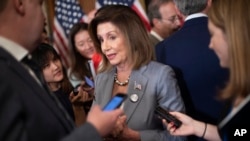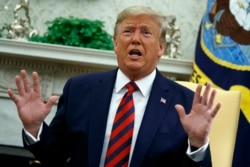House Speaker Nancy Pelosi on Saturday criticized President Donald Trump's plan to send additional U.S. military forces and air defense equipment to Saudi Arabia and the United Arab Emirates, saying it was the administration's latest attempt to "circumvent" Congress.
"President Trump's plan to accelerate the delivery of military equipment to Saudi Arabia and UAE, and to deploy additional U.S. forces to the region, is the latest outrageous attempt by the Trump administration to circumvent the bipartisan, bicameral will of Congress," she said in a statement. "These unacceptable actions are cause for alarm."
Defense Secretary Mark Esper and Gen. Joseph Dunford, chairman of the Joint Chiefs of Staff, announced Trump's decision Friday night at the Pentagon.
Allies' requests
Esper said the forces would be "defensive in nature." He added that the U.S. was responding to requests from Saudi and UAE officials to improve their air and missile defenses after last weekend's attacks on Saudi Arabian oil installations. U.S. officials have said Iran was responsible, an allegation that Tehran denies.
The Sept. 14 assault exposed the vulnerability of the region's oil facilities to drone and cruise missile attacks.
Details regarding the U.S. deployments were to be discussed over the weekend and released next week, Dunford said Friday.
"Secretary [of State Mike) Pompeo just came back this morning, and the Saudis asked for enhanced capabilities," Dunford said. "We haven't decided on specific units," but those chosen would help enhance the countries' air missile defenses.
Pelosi said in her statement that the House and Senate had passed bipartisan legislation months ago to block arms sales to Saudi Arabia and UAE, as well as condemn the Saudis' involvement in Yemen.
"Once again, President Trump is turning a blind eye to Saudi Arabia's continued violence against innocent Yemenis, as well as its horrific murder of journalist Jamal Khashoggi and its gross abuses of human rights, which represent a moral and humanitarian crisis," she added.
Iranian defiance
Hours after the U.S. announced the deployment, the head of Iran's elite Revolutionary Guards, General Hossein Salami, warned that his forces "are ready for any scenario." Salami added: "If anyone crosses our borders, we will hit them."
Also late Friday, the United Nations announced that it had sent a four-member team of international experts to Saudi Arabia to investigate the attacks on the oil installations.
Earlier in the day, Trump announced new sanctions against Iran's national bank, further escalating economic pressure on the Islamic Republic, but pulling back from any direct military action.
"I think the sanctions work," Trump said during a joint White House news conference with Australian Prime Minister Scott Morrison. Trump also said "the military would work, but that is a very severe form of winning."
But Trump said he was not planning a military response to the attacks, telling reporters in the Oval Office, "The strong-person approach and the thing that does show strength would be showing a little bit of restraint."
Trump warned, however, that "Iran knows if they misbehave, they're on borrowed time."
Trump announced the sanctions as his administration weighed other options on Iran, including military strikes. Iranian Foreign Minister Mohammad Javad Zarif said Thursday that a U.S. or Saudi military strike against his country would trigger "an all-out war."
The United States previously imposed sweeping sanctions on Iran because of its alleged nuclear program. But the U.S. Treasury Department said Friday that the latest sanctions had been imposed because Iran's central bank engaged in "terrorism" by providing "billions of dollars" to the Islamic Revolutionary Guard Corps and Hezbollah.
Iranian President Hassan Rouhani has often said that any negotiations between himself and Trump can occur only if the U.S. first provides sanctions relief.







